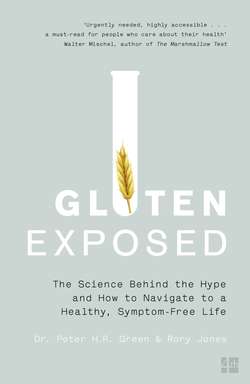Читать книгу Gluten Exposed: The Science Behind the Hype and How to Navigate to a Healthy, Symptom-free Life - Rory Jones, Dr. Green Peter - Страница 33
6 A Word on Testing—What Do Antibodies Tell Us?
ОглавлениеTest first, then you treat right.
—NORTH AMERICAN SOCIETY FOR THE STUDY OF CELIAC DISEASE
Many people complain that they are “simply lab results” to their doctors. But these tests are often the most effective way of finding—as well as ruling out—serious conditions and avoiding complications. Rushing to self-diagnose gastrointestinal distress can mask a serious condition or prolong symptoms that can be cured if recognized and treated medically. Lab tests cannot resolve every issue, and they can lead to false conclusions, but they can quickly pinpoint and/or eliminate the causes of many GI complaints.
Since the GI tract is difficult to see without invasive procedures, various blood and breath tests can explain why some people do not respond to a gluten-free diet, why a drug may not cure a symptom—or cause others—and help to identify actual vitamin and mineral deficiencies. They enabled us to diagnose Carol’s drug-induced hepatitis before it caused serious complications and permanent liver damage. (See chapter 5, “Supplements and Probiotics.”)
Diagnostic tests for specific conditions are described in the following chapters, but it is important for anyone suffering from GI symptoms that they feel are caused by or related to gluten to understand the basic tests used to facilitate a diagnosis. What you see and feel may be the tip of a hidden iceberg, and a gluten-free diet may not help you avoid the impact of a collision.
